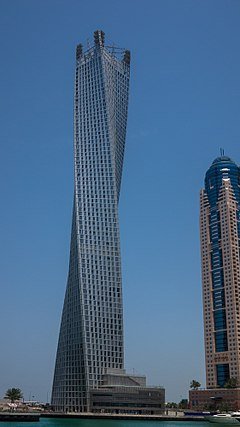
noun
- a building or structure high in proportion to its lateral dimensions, either isolated or forming part of a building.
- such a structure used as or intended for a stronghold, fortress, prison, etc.
- any of various fully enclosed fireproof housings for vertical communications, as staircases, between the stories of a building.
- any structure, contrivance, or object that resembles or suggests a tower.
- a tall, movable structure used in ancient and medieval warfare in storming a fortified place.
- a tall, vertical case with accessible horizontal drive bays, designed to house a computer system standing on a desk or floor.Compare minitower.
- Aviation. control tower.
verb (used without object)
- to rise or extend far upward, as a tower; reach or stand high: The skyscraper towers above the city.
- to rise above or surpass others: She towers above the other students.
- Falconry. (of a hawk) to rise straight into the air; to ring up.
- tower of strength, a person who can be relied on for support, aid, or comfort, especially in times of difficulty.
noun
- a person or thing that tows.
noun
- the fiber of flax, hemp, or jute prepared for spinning by scutching.
- the shorter, less desirable flax fibers separated from line fibers in hackling.
- synthetic filaments prior to spinning.
adjective
- made of tow.
noun
- a tall, usually square or circular structure, sometimes part of a larger building and usually built for a specific purposea church tower; a control tower
- a place of defence or retreat
- a mobile structure used in medieval warfare to attack a castle, etc
- tower of strength a person who gives support, comfort, etc
verb
- (intr) to be or rise like a tower; loom
verb
- (tr) to pull or drag (a vehicle, boat, etc), esp by means of a rope or cable
noun
- the act or an instance of towing
- the state of being towed (esp in the phrases in tow, under tow, on tow)
- something towed
- something used for towing
- in tow in one’s charge or under one’s influence
- informal (in motor racing, etc) the act of taking advantage of the slipstream of another car (esp in the phrase get a tow)
- short for ski tow
noun
- the fibres of hemp, flax, jute, etc, in the scutched state
- synthetic fibres preparatory to spinning
- the coarser fibres discarded after combing
Old English torr, from Latin turris “high structure” (cf. Old French tor, 11c.; Spanish, Italian torre “tower”), possibly from a pre-Indo-European Mediterranean language. Also borrowed separately 13c. as tour, from Old French tur. The modern spelling first recorded in 1520s. Meaning “lofty pile or mass” is recorded from mid-14c.
c.1400; see tower (n.). Related: Towered; towering.
“pull with a rope,” Old English togian “to drag, pull,” from Proto-Germanic *tugojanan (cf. Old English teon “to draw,” Old Frisian togia “to pull about,” Old Norse toga, Old High German zogon, German ziehen “to draw, pull, drag”), from PIE root *deuk- “to pull, draw” (cf. Latin ducere “to lead;” see duke (n.)). Related: Towed; towing. The noun meaning “act or fact of being towed” is recorded from 1620s. Towaway, in reference to parking zones, is recorded from 1956.
“coarse, broken fibers of flax, hemp, etc.,” late 14c., probably from Old English tow- “spinning” (in towlic “fit for spinning”), perhaps cognate with Gothic taujan “to do, make,” Middle Dutch touwen “to knit, weave.”
In addition to the idiom beginning with tower
- tower of strength
also see:
- ivory tower
see in tow.
 Liberal Dictionary English Dictionary
Liberal Dictionary English Dictionary